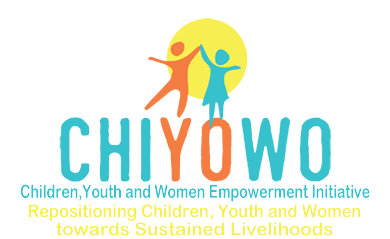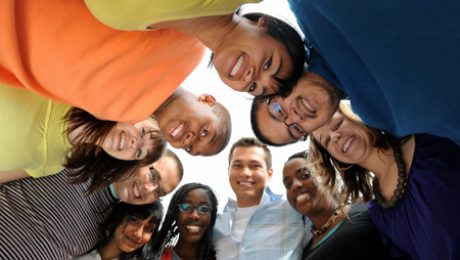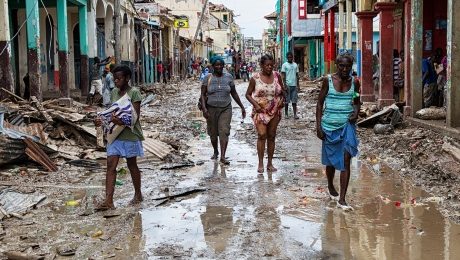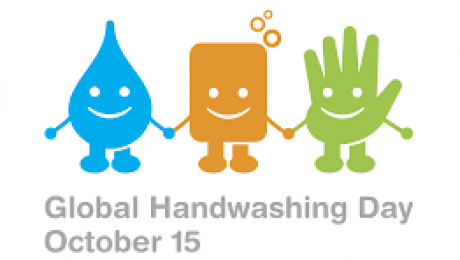International Day for the Eradication of Poverty
International Day for the Eradication of Poverty
By ChiYoWo
Almost half of the world, over 3 billion people is considered to be living in poverty, surviving on less than $2.50 a day. More than 1.3 billion people are considered to be living in extreme poverty, living on less than $1.25 a day. International Day for the Eradication of Poverty was created to help raise awareness to these alarming statistics and the need to eradicate poverty and destitution all across the globe. It promotes dialogue and understanding between people living in poverty and their communities, and society at large (1).
Effects of Poverty
Poverty doesn’t just mean living on little to no money. Issues like hunger, illness, lack of shelter, and no access to healthcare, education, or other services are all effects of poverty. One of the biggest issues however, is the lack of access to clean, safe water. Nearly 1 billion people across Africa do not have access to clean drinking water (2). Without clean water, many problems arise. People are at great risk for many waterborne diseases. It is estimated that 50 percent of Africans have a waterborne disease such as cholera and with unsafe water; growing food is not an option. With no food, comes hunger. A staggering 75 percent of the world’s poorest countries are located in Africa, with one in four people being undernourished (3). That is an estimated 233 million people and living on less than a $1.25 makes this a very unsettling statistic (4, 5). Although environmental factors and conflict do weigh in, it simply comes down to the fact that without sufficient income and unclean water, people do not have the means to purchase or grow food (5). However, with no access to clean water and food, children are removed from school to help fetch water where ever they can find it such as from streams or wells. Sometimes children work to help support their families. Ultimately, such children are not able to get the education they deserve.
Helping End Poverty
We must all work together and help end poverty. We need to make sure that every person on this planet has access to clean drinking water, education, jobs, and food. Please help observe International Day for the Eradication of Poverty on October 17th. If we all work together we can make this world a better place.
Sources:
[1.] World Health Organization – http://www.who.int [2.] The Water Project- https://thewaterproject.org/why-water/poverty [3.] The Borgen Project – http://borgenproject.org [4.] Do Something.org- https://www.dosomething.org [5.] Worldhunger.org – http://www.worldhunger.org- Published in ARTICLES
Youth Leadership and Mentoring: Quick Facts
Youth Leadership and Mentoring: Quick Facts
By ChiYoWo
The good news is Nigeria has been experiencing a sustained period of economic growth in the last decade. The bad news is that Nigeria has also been experiencing a sustained period of jobless growth. So, while the economy has been doing well, people are still left underemployed or unemployed. This unemployment crisis has particularly hit Nigeria’s youth. With Nigeria’s population reaching 185 million and with at least half of that population considered youth, this is really a big of a problem for the most populous nation on the African Continent. According to the National Population Commission, youth is defined as an individual between the ages of 15 and 34.
So what is it that causing so many youth to be affected by this unemployment crisis? According to Brookings, there are several factors that contribute to unemployment in youth. These include the lack of education, and a high population growth rate.
So what can we do? Fortunately, there are many things we can do to help our youth overcome this obstacle. For one, we can initiate youth mentoring programmes. It is shown that deficient school curricula and poor teacher training have contributed to the failure to provide students with appropriate skills to make them employable. By initiating youth mentorship programmes, we are showing our youth that we do in fact care about their future. According to the National Mentoring Partnership, “Mentoring, at its core, guarantees young people that there is someone who cares about them, assures them they are not alone in dealing with day-to-day challenges, and makes them feel like they matter. Research confirms that quality mentoring relationships have powerful positive effects on young people in a variety of personal, academic, and professional situations. Ultimately, mentoring connects a young person to personal growth and development, and social and economic opportunity. Yet one in three young people will grow up without this critical asset.”
Here are some quick facts about young adults that had a mentor in America which Nigeria can learn from:
- 55% more likely to enroll in college
- 78% more likely to volunteer regularly
- 90% are interested in becoming a mentor
- 130% more likely to hold leadership positions
We must educate and show our children that we care about them and we care for their future. Providing a mentor will not only show them that someone cares for their future, we are in turn teaching them leadership skills that will have for the rest of their lives. Let’s get involved today!
Sources:
[1.] Mentoring – http://www.mentoring.org/why-mentoring/mentoring-impact/ [2.] Country Meters – http://countrymeters.info/en/Nigeria [3.] AfriGrowth Foundation – http://afrigrowth.org/programs/youth-mentoring/ [4.] Dalberg – http://www.dalberg.com
- Published in ARTICLES
Life in Haiti after Hurricane Matthew in 2016
Life in Haiti after Hurricane Matthew in 2016
By ChiYoWo
Six years after dealing with a devastating 7.0 magnitude earthquake that killed more than 200,000 people and destroyed more than 300,000 buildings, Haiti had to deal once more with tragedy.
Hurricane Matthew swept through the country on October 4, 2016 killing more than 1,000 people, leaving 175,000 people homeless and 1.4 million in need of food assistance. The country’s Directorate of Civil Protection claimed that when Hurricane Matthew slammed into Haiti it was a Category 4 hurricane that that had 145-mph winds. According to BBC News, almost 90 percent of Haiti’s south had been completely destroyed.
Though there have been many aid groups out surveying the damage and trying to reach as many people as they can, they are struggling with reaching the hardest hit areas such as Jérémie due to fallen trees, debris and roads and bridges that are impassable. There are also various roadblocks set up by desperate people trying to divert aid trucks so that they too may get supplies. Along with the need of food and shelter many need clothes, shoes, and medical care. According to Reuters, there are people with injuries such as broken bones that have not been treated since the hurricane hit.
Not only do the people of Haiti have to worry about finding food, shelter, and medical attention, but they also fear that disease may strike in the wake of disaster-fears that have been proven legitimate. There are at least 2,271 suspected cases of cholera in Haiti with the number rising every day. Haitians also have to worry about tetanus and waterborne diseases worsening due to persistent rainfall. Other worries include access to healthcare for pregnant women and protection for the women and girls that have been displaced.
Amidst all of this chaos however, the people of Haiti solider on. Marielle Sander, the United Nations Population Fund representative for Haiti says she remembers a midwife in Jérémie deliver six babies in the height of the storm with “water up to her knees”.
There are many people trying to resume their lives as best as they can. Some schools have reopened (although supplies such as books are still needed), people are going back to work if they are able, and the markets are slowly bouncing back.
Though there is a long road to recovery for Haiti, with the commitment and dedication from everyone in the world, they can rebuild and come back stronger than ever! There are websites you can visit to help today.
Sources:
[1.] Weather.com – https://weather.com/news/news/hurricane-matthew-haiti-latest-news-0 [2.] CNN – http://www.cnn.com/2016/10/06/americas/hurricane-matthew-cuba-haiti/ [3.] USA Today – http://www.usatoday.com/story/news/world/2016/10/26/hurricane-battered-haiti-matthew-recovery/92678570/ [4.] Weather.com https://weather.com/storms/hurricane/news/hurricane-matthew-by-the-numbers [5.] Weather.com https://weather.com/news/news/hurricane-matthew-haiti-effects-continue [6.] Weather.com https://weather.com/news/news/hurricane-matthew-haiti-effects-continue
- Published in ARTICLES
Let’s be kind to one another …
Let’s be kind to one another …
By ChiYoWo
In 1998 the World Kindness Movement introduced World Kindness Day on November 13th. World Kindness Day focuses on the good deeds being done throughout communities, and focuses on the positive power and the common thread of kindness that binds us all together. According to Gulf News “it is a day that encourages individuals to overlook boundaries, race and religion” There are many ways you can participate in World Kindness Day.
Here are two suggestions to help you get started on World Kindness Day.
- Share a kindness quote. There are many quotes out there about kindness, such as “No act of kindness, no matter how small, is ever wasted “–Aesop. So, find your favorite one, put on Facebook and Twitter and tell it to your co-workers and friends.
- Do Kindness. We should do kindness every day, but especially on World Kindness Day! There are many activities you can do such as: writing a note of encouragement to someone, picking up rubbish, recycling, helping someone out to their car, or donating to charity.
Random facts about kindness
Kindness Fact #1: Did you know engaging in acts of kindness produces endorphins, the brains natural painkiller?
Kindness Fact #2: Like most medical antidepressants, kindness stimulates the production of serotonin. This feel-good chemical heals your wounds, calms you down, and makes you happy!
Kindness Fact #3: The positive effects of kindness are experienced in the brain of everyone who witnessed the act, improving their mood and making them significantly more likely to “pay it forward.” This means one good deed in a crowded area can create a domino effect and improve the day of dozens of people!
So, no matter where you are in the world or whether you are young or old, be sure to spread kindness and participate in World Kindness Day!
Sources:
[1.] The World Kindness Movement – http://www.theworldkindnessmovement.org/ [2.] Random Acts of Kindness – https://www.randomactsofkindness.org/about-us- Published in BLOG
International Men’s Day
International Men’s Day
By ChiYoWo
On February 7, 1992 International Men’s Day was first created. It is now celebrated annually on November 19th in over 60 countries. The objective of International Men’s Day is to focus on men’s and boy’s health, improving gender relations, promoting gender equality, and highlighting positive role models. It is a day for men to celebrate all of their achievements and their contributions to their families, communities, marriages, and children. It is also a day to focus on men’s wellbeing socially, emotionally, physically, and spiritually.
The theme for this year’s International Men’s Day is STOP MALE SUICIDE. Sadly, the suicide rate for men is three times higher than women in every country. Annually, there are some 475,000 deaths from murder, of which 80% are male. On top of high suicide rate, data shows that men are overall unhealthier than women in almost every part of the world due to numerous factors. Some of these factors being, the majority of smokers are male, men are also more likely to drink and do illegal drugs than women, they overall have a poorer diet and are faced with more occupational health hazards than woman. Globally, men’s life expectancy rate has dropped down from 69 years to 58.3 years.
Now is the time to bring attention to the issues the men in our world are facing! We need to show we are there for them and care for them as they care for us.
There have been and are many methods of commemorating International Men’s Day such as public seminars, conferences, festivals and fundraisers, classroom activities at schools, radio and television programs, religious observances, and peaceful displays and marches. You can participate in observing International Men’s Day by telling those special men in your life how much they mean to you! Let’s celebrate men and all that they do for the family, friends, jobs, communities and their nations!
[1.] Mens Day – http://www.mensday.ws/en/about.php [2.] BCMJ – http://www.bcmj.org/articles/silent-epidemic-male-suicide [3.] Wikipedia – https://en.wikipedia.org/wiki/International_Men%27s_Day [4.] Mens Health Week – http://www.menshealthweek.org.au [5.] International Mens Day – http://www.internationalmensday.com/
- Published in BLOG
International Day for the Elimination of Violence Against Women
International Day for the Elimination of Violence Against Women
By ChiYoWo
International Day for the Elimination of Violence Against Women was designated to November 25th by the United Nations General Assembly. This date was chosen in remembrance of the assassination of three sisters Maria, Teresa, and Minerva Mirabel. The Mirabel sisters were activists from the Dominican Republic who were opposed to the dictatorship of Rafael Trujillo and were involved in clandestine activities against his regime. Because they were protesting against Trujillo, he ordered for them to be assassinated.
Today, the premise of the International Day for the Elimination of Violence Against Women is to raise awareness to the fact that women all around the world are subject to rape, domestic violence as well as other forms of violence.
Quick Facts
- 1 in 3 women experience physical or sexual violence-mostly by an intimate partner.
- Women who have been physically or sexually abused by their partners are more than twice as likely to have an abortion, almost twice as likely to experience depression, and in some regions, 1.5 times more likely to acquire HIV, as compared to women who have not experienced partner violence.
- It is estimated that of all women who were the victims of homicide globally in 2012, almost half were killed by intimate partners or family members, compared to less than six per cent of men killed in the same year.
- Around 120 million girls worldwide (slightly more than 1 in 10) have experienced forced intercourse or other forced sexual acts at some point in their lives. By far the most common perpetrators of sexual violence against girls are current or former husbands, partners or boyfriends.
Many women’s organizations have pulled together to increase awareness and gather support. It is time for us to join in and end violence against women together.
Please, help us celebrate and take action by participating in International Day for the Elimination of Violence Against Women. The 25th of November is known as “Orange Day’ so be sure to wear something orange!
Sources
[1.] UN Women – http://www.unwomen.org [2.] History – http://www.history.com
- Published in BLOG
World Food Day: Food a Basic Human Right?
World Food Day: Food a Basic Human Right?
By ChiYoWo
Hunger. What do you picture when you think of hunger? Do you think about how you have not eaten in four hours and you really need a snack? Or do you think about the over 805 million people (that is 1 in every 9 people) who live in chronic hunger? Food is a basic human right, yet many people around the world do not have access to safe and nutritious dietary food needed to lead productive lives.
Hunger Facts:
- Sub-Sharan Africa has the highest prevalence of hunger as 1 in 4 people are undernourished,
- Poor nutrition causes nearly half (45 percent) of deaths in children under five. That is 3.1 million children each year,
- 1 out of 6 children (roughly 100 million) in developing countries is underweight,
- Over 70 percent of food insecure people live in rural areas of Africa, Asia, Latin America and the Near East. Many of them are small hold family farmers.
Now, wait a minute. Did that last statistic say that family farmers are food insecure? Yes. Most farmers are able to produce enough food to feed others around them, but not for themselves. Most often, they lack adequate storage for their crops, transportation, access to good seeds, well-functioning markets, and financing.
Did you know that if women farmers had the same access to resources as male farmers do, the number of hungry people could be reduced by up to 150 million! What an accomplishment that would be!
So, participate in World Food Day with us! World Food day is celebrated on the 16th of October every year in in honor of the date that the Food and Agriculture Organization was founded. This is take action day is for everyone to come together and make a commitment to eradicate hunger. Join us on this journey of stopping world hunger!
Sources:
World Food Day USA – http://www.worldfooddayusa.org/what-is-wfd
All Africa – http://allafrica.com
World Food Programme – https://www.wfp.org/hunger/stats
- Published in BLOG
International Day of the Girl Child
International Day of the Girl Child
The event which focuses on the theme ““Girls’ Progress = Goals’ Progress: A Global Girl Data Movement”.
Why International Day of the Girl Child?
October 11, 2012 was the first day the girl child was recognized. International Day of the Girl Child is an international observance day declared by the United Nations; it is also called the Day of the Girl and the International Day of the Girl (IDG). The observation supports more opportunities for girls and increases awareness of gender inequality faced by girls worldwide based upon their gender. This inequality includes areas such as right and access to education, nutrition, legal rights, medical care, and the protection from discrimination, violence against women and child marriage.
Objective of IDG 2016
- Enhance national capacity and systems to collect, analyze and disseminate gender data across the age spectrum to improve statistics on gender-based violence, adolescent pregnancy and reproductive health, informal employment, entrepreneurship, unpaid work, and other priorities for girls and young women.
- Disaggregate data on boys and girls and along other dimensions (e.g., ethnicity, age, income-level, disability, location, migration status, etc.) to better understand exactly which children and adolescents are most disadvantaged and where.
- Improve data collection efforts for often undercounted groups – such as data on sexual violence against younger adolescent girls (10-14).
- Harness “big data” and technology to close the gender data gaps in areas where progress for girls is often difficult to measure due to issue sensitivity or the huge data volume required, including through analysis of girls’ opinions on key development issues on social media.
- Remedy the gender bias in existing measurement tools, particularly biases that exclude the most vulnerable. For example, improved data collection tools can prevent under-reporting of violence against girls and under counting of their births and deaths.
- Pilot and scale-up innovative real-time data platforms to monitor and adapt programming for girls, to ensure girls are active participants in program design and that programs achieve the most impactful results.
- Published in BLOG
United Nations Day
United Nations Day
By ChiYoWo
The United Nations is an international organization that was created to give countries the opportunity to meet together and discuss important world issues. These issues include international conflicts, world peace, and social justice for humanity. The United Nations encourage resolutions without war, and form policies on international issues.
Aims:
The United Nations has four main purposes. These purposes are:
- Maintaining worldwide peace and security,
- Developing relations among nations,
- Fostering cooperation between nations in order to solve economic, social, cultural, or humanitarian international problems, and
- Providing a forum for bringing countries together to meet the UN’s purposes and goals.
History of United Nations Day
Shortly after World War II ended, representatives from 51 countries got together and drew up the United Nations Charter. On October 24, 1945 the United Nations officially came into existence. The Charter was sanctioned by China, France, Soviet Union, United Kingdom, United States of America, and many more countries and has been celebrated every year.
United Nations Day is committed to letting people all over the globe know the goals and achievements of the United Nations Organization. This year’s United Nations Day theme was, “concrete actions people can take to help achieve The Sustainable Development Goals”
According to UN Secretary –General Ban Ki-moon, “Humanity has entered the era of sustainability – with a global commitment to fulfil the great promise of the 2030 Agenda for Sustainable Development. In this, the Organization’s 71st year, we have 17 goals to propel us towards a better future for all on a healthy planet.”
Therefore, to achieve sustainable development the following practical goals have been identified:
- Donate what you don’t use
- Avoid throwing away food
- Vaccinate your family
- Avoid wasting water
- Think of innovative ways to re-purpose old material
- Recycle paper, plastic, glass, and aluminum
- Avoid using plastic bags to keep the oceans safe and clean
Sources:
[1.] United Nations – http://www.un.org/en/events/unday/ – http://www.un.org/en/sections/history/history-united-nations/ – http://www.un.org/en/events/unday/posters.shtml [2.] Study – http://study.com
- Published in ARTICLES
Global Handwashing Day – October 15th
Global Handwashing Day- October 15th
By ChiYoWo
It is extremely important to teach our children how to properly wash their hands. According to Globalhandwashing.org every year, 1.7 billion children do not live to celebrate their 5th birthday because of diarrhea and pneumonia. Three quarters of these children are located in Sub-Saharan Africa and South Asia. The most effective way to prevent these diseases is to use soap when washing your hands.
Global Handwashing Day was created to promote hand washing with soap throughout the world and to raise awareness about the benefits of washing your hands. We must teach our children how to wash their hands the right way, and when they should be washing their hands.
How to properly wash your hands:
·Wet your hands with clean running water (either warm or cold).
·Apply soap (This can be liquid, bar or powder soap).
·Lather by rubbing your hands together and scrub vigorously for 20 seconds.
·Rinse hands really well.
·Dry your hands with either a clean or disposable towel or air dryer.
When to wash your hands:
· Before handling food
·Before treating wounds, giving medicine, or caring for someone who is sick
·After using the bathroom
·After you touch animals
·After you sneeze, cough, or touch your face
·After preparing food, especially raw meats
·After you get done being/playing outside
Celebrate Global handwashing Day with us every year on October 15th and help us raise awareness to the importance of washing our hands for the safety of ourselves and others. Using soap while washing your hands is not only an easy and effective way to prevent diseases, but it is also affordable.
[1.] Globalhandwashing.org – http://globalhandwashing.org/[2.] CDC – https://www.cdc.gov/features/globalhandwashing/
[3.] Mayo Clinic – http://www.mayoclinic.org/
- Published in BLOG




